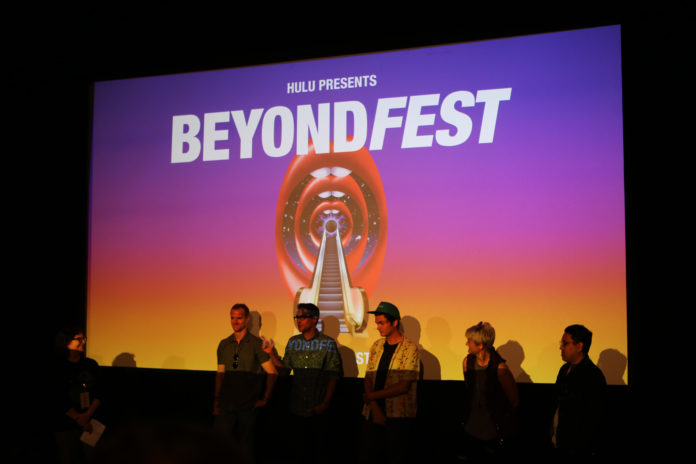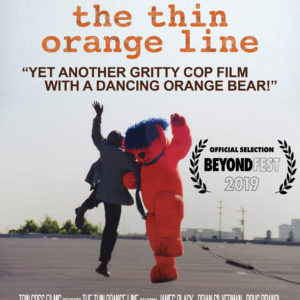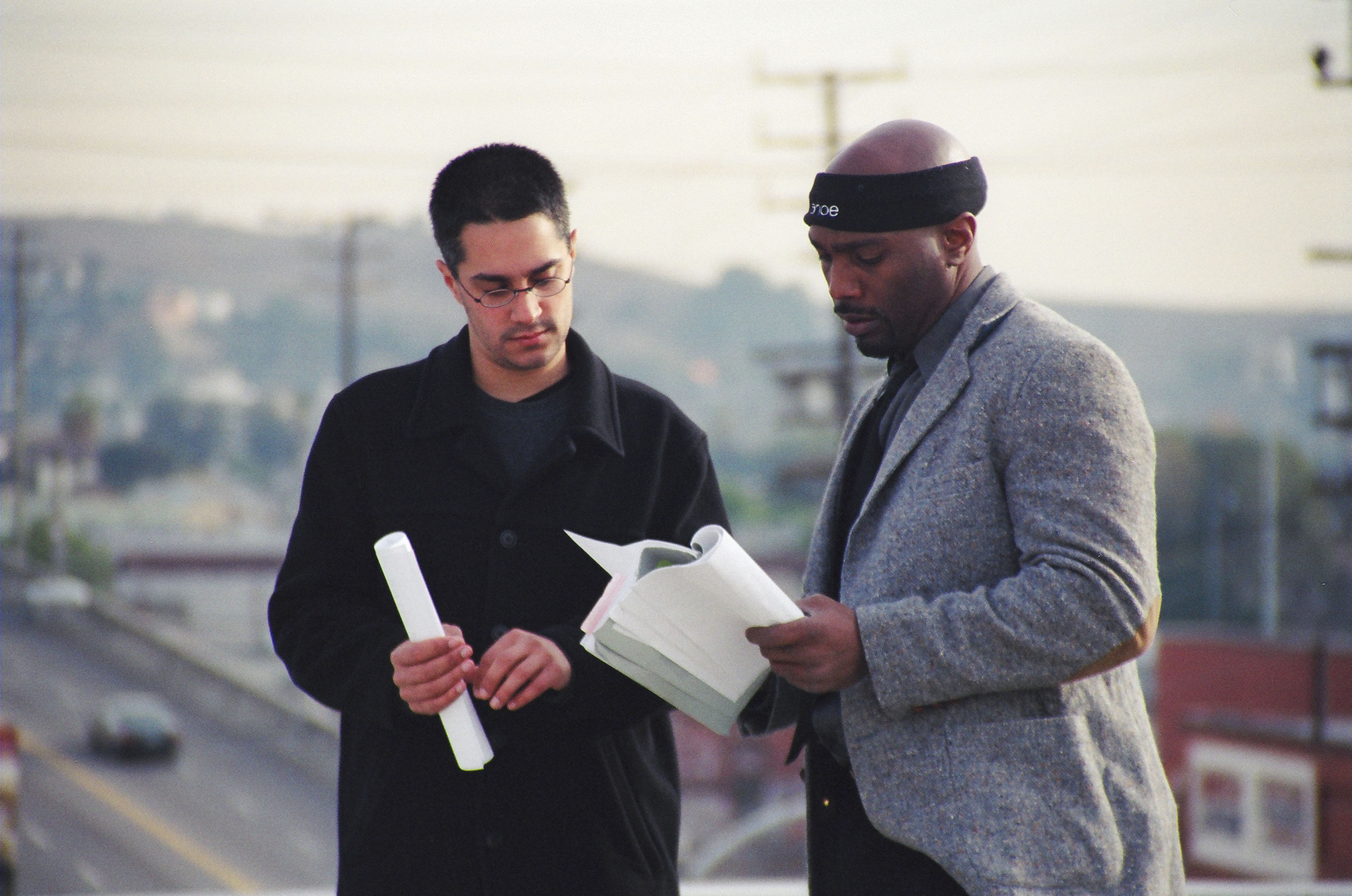
Media Arts & Culture (MAC) professor Aleem Hossain’s short film — the gritty, witty cop movie “The Thin Orange Line” — found new life 15 years after its creation at Beyond Fest, the highest-attended genre film festival in the U.S., at Egyptian Theater Sept. 29. This was the first year of Beyond Fest’s shorts edition, and Hossain’s film was selected to the second of its four programs: This Is Crime-time. The film was produced in 2004 as Hossain’s graduate thesis film at University of California, Los Angeles (UCLA) and was re-edited by Hossain over this summer to submit for festivals.
“The Thin Orange Line” follows the story of a cop who runs into his childhood imaginary friend while chasing down a fugitive. It opens with a gripping chase sequence, which ends with the cop pointing his gun at the captured fugitive. The realism and tension soon break down into a weird genre mishmash when a big orange bear appears; it deters the cop from pulling the trigger and invites him to dance. The film defies its audience’s expectation of a conventional revenge-fueled cop movie by providing a whimsical mismatch between the bear’s vitality and the tension of the situation. Although a viewer may readily expect to see a dancing orange bear due to its presence on the movie’s poster, its entrance is still surprising as it interjects itself into the film’s supposedly realist flow, amusing the audience with its flagrant innocence, clumsy dance moves and bumping blue hair.

“I think the only reason to make a short film right now is to make one that only you would make,” Hossain said. “The only thing worth doing as an artist is something that wouldn’t exist if you weren’t here on the planet.”

As Hossain’s thesis film at UCLA 15 years ago, “The Thin Orange Line” embodies Hossain’s distinct creativity and personal tastes.
“I was in love with cop movies at the time,” Hossain said. “Just obsessed with them.”
Hossain also said the initial idea for the film actually came from a rock.
“When I was like 6 or 7, I played outside a lot in the yard. And I found this little gray rock one day, and for some reason, I decided that that rock was alive and was my friend,” Hossain said. “I basically had a kind of classic imaginary friend relationship with that rock, except it actually happened to have a physical form.”
Hossain said as a kid, he used to put the rock in a specific spot outdoors and went out to talk to it every day. As he grew up, moved and went to graduate school, the rock faded into his memory — until he found a photograph in his parents’ attic with the rock in the corner.
“The first question that occurred to me was, ‘Man, what would that rock think of me now?'” Hossain said. “I thought that was an interesting question, and I actually instantly thought, ‘Oh, I wonder if there is a film there.’”
Refusing to rehash any existing typical cop movie or tell an autobiographical story about himself and the rock, Hossain found a middle ground by creating a story about a cop at a crossroads in life who is prompted by an imaginary friend to think about how his life has played out. The rock seemed too dull for the film, so Hossain found his ideal imaginary bear friend at the costume warehouse during a Warner Brothers studio tour.
Hossain, having grown up watching Indian musicals, said he knew he wanted to incorporate Bollywood into the film by taking inspiration from the French movie “Band of the Outsiders.”
“There’s a moment in the middle of that movie where, for no apparent reason, the main characters break out into a dance. And I saw that, and I was just blown away by it,” Hossain said. “I remember in the original ad that I posted for a choreographer, I said, ‘I want somebody who can combine Bollywood with Band of Outsiders.'”
Nicole McControversy, the shorts programmer of Beyond Fest and Boston Underground Festival, said she immediately loved Hossain’s short film.
“I really like surprises,” McControversy said. “So what struck me first about the film is, it’s very surprising; you cannot predict what is going to happen.”

The audience at Beyond Fest’s Short Program reacted in a similar way. However, most audiences met the film with criticism 15 years ago, according to Hossain. He said at the Q&A at Beyond Fest that a Hollywood talent agent called his film “an expensive ad for [Hossain’s] inability to choose a lane.”
Brian Silverman, who played the fugitive in “The Thin Orange Line” and the lead in Hossain’s feature film “After We Leave,” attributed critics’ change in attitude to the more open environment in film today. Silverman said he admired filmmakers’ push toward multiculturalism, blending genres such as Bollywood and cop movies to create unique new films.
The decision to revisit this long-buried film stemmed from a dream Hossain had in April. Hossain said he was in a creative gap having just finished post-production of his feature film “After We Leave,” which premiered in London in May 2019.
“When I woke up in the morning, I suddenly realized that I had not asked myself a question in many years, which was ‘Would the reaction to the film be different now than it was 15 years ago?’” Hossain said. “I think tastes have changed. I think people would think it was less weird now. I think our tastes are more eclectic now.”
McControversy found Hossain’s decision impressive.
“I think it was really cool and unusual,” McControversy said. “I thought it was brave and also just shows someone who’s really dedicated to their work — someone who can reevaluate their own work, come back at it with a lot more experience and maturity, and decide now is a good time to try and do something with this.”
When he found out his 15-year-old film was selected to Beyond Fest, Hossain said his reaction was pure excitement. He views the film as a reflection of his life.
“This film has come back to me 15 years later, and I thought it’s made me ask myself similar questions. ‘How have I changed as a filmmaker? Where am I going and what have I done?’” Hossain said. “And it’s been nice to sort of reflect on that and actually be happy with the answers —to feel like, ‘Oh, I do feel like I’ve grown and, look, 15 years later, I am still making movies.’”
![]()






























